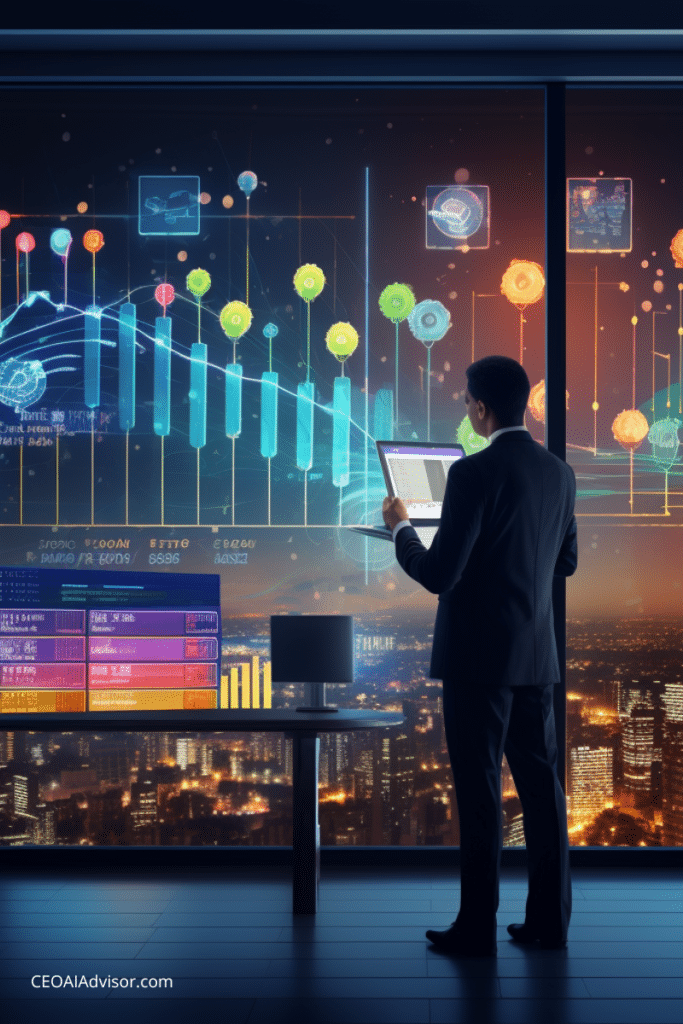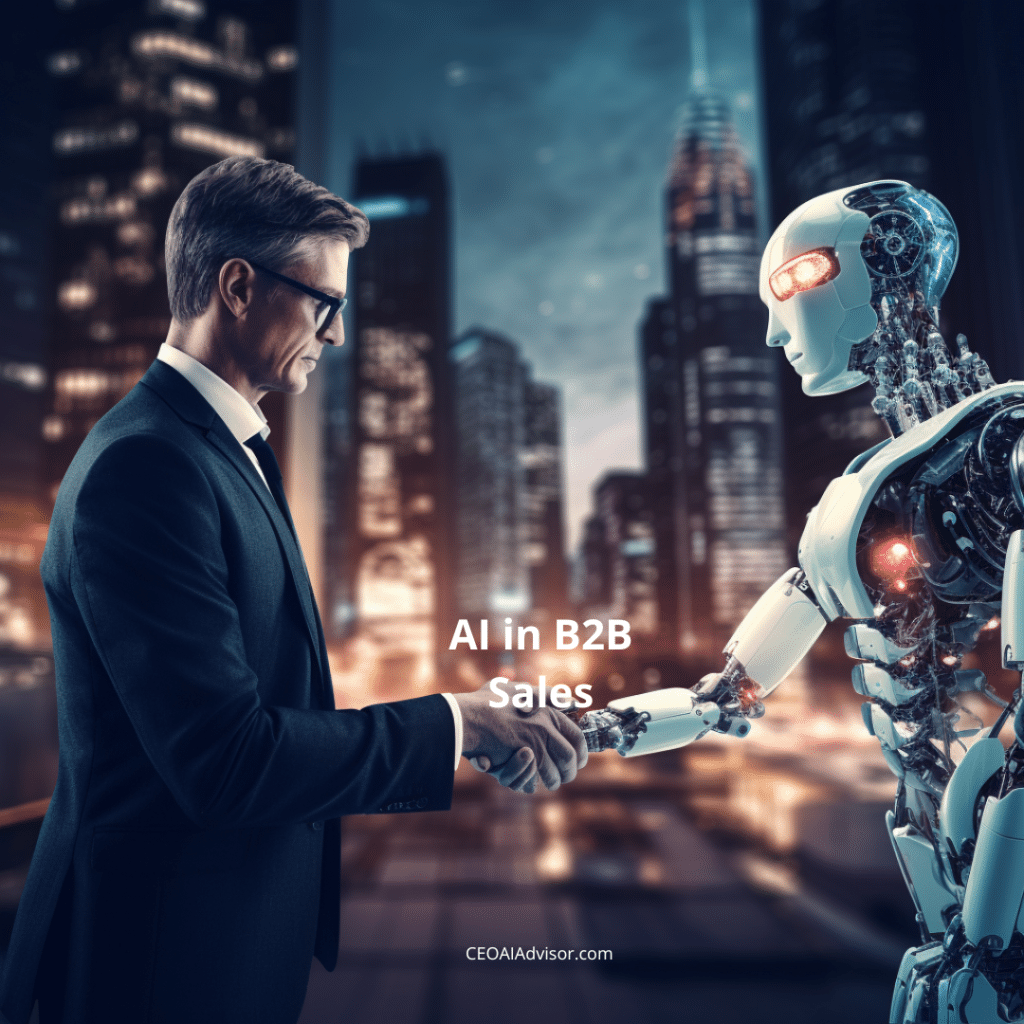Artificial intelligence (AI) has become an increasingly important aspect of the business world, transforming industries with its wide array of applications and capabilities. One of the areas experiencing significant growth and change due to AI is B2B marketing.
With 80% of B2B marketing executives predicting that AI will revolutionize their field within the next five years, it’s clear that marketers are embracing emerging technology to enhance their strategies and processes. But are they using AI efficiently? Lets explore.

As AI evolves rapidly, the marketing landscape becomes more dynamic, with machine learning and algorithms quickly automating various tasks.
This shift has led to a focus on data-driven marketing, with marketers leveraging AI to analyze large quantities of data, extract valuable insights, and optimize their marketing efforts.
Key applications of AI within B2B marketing range from personalized recommendations to improved targeting and segmentation, ultimately leading to more impactful customer engagement and increased conversion rates.
Key Points We Will Look At:
- AI is transforming B2B marketing through automation and data analysis
- Personalized recommendations and optimization of marketing strategies are crucial features of AI-driven B2B marketing
- The future of AI in B2B marketing will encompass continued advancements such as machine learning and even greater personalization in customer engagement.
Understanding AI in B2B Marketing
In recent months, there has been a growing interest and need to incorporate artificial intelligence (AI) into various aspects of business, including business-to-business (B2B) marketing.
As a professional working daily in this field, I see firsthand how AI has the potential to revolutionize the methods we use to execute B2B marketing strategies. In this section, I will briefly overview AI in B2B marketing and its benefits.
AI encompasses a range of advanced technologies, including machine learning, natural language processing, and deep learning, which enable machines to mimic human cognitive functions. These capabilities allow AI tools to analyze vast amounts of data, identify patterns, and generate insights that can improve marketing strategies and increase efficiency.
Generative AI and many of the newer AI tools and models in 2024 will greatly help B2B marketers accomplish their job more effectively.
One notable advantage of AI in B2B marketing is its ability to enhance customer segmentation and targeting.
AI algorithms can analyze multiple data sources, such as website behavior, email interactions, and social media activities, to better understand customer preferences and behaviors. This information enables marketers to create more personalized and relevant content to enhance customer engagement and drive conversions.
Another benefit of AI in B2B marketing is the automation of repetitive tasks. For example, AI-powered tools can streamline email marketing processes, such as A/B testing of subject lines or content, which can save time and resources.
Additionally, AI-powered chatbots can provide instant, personalized support to prospects and customers, freeing up sales and customer support teams to focus on higher-value tasks.
Integrating AI within the B2B marketing landscape is not without challenges.
Implementing AI technologies can be complex, requiring adequate resources and expertise. Moreover, the evolving nature of AI raises questions about accountability and decision-making processes in automated systems.
As a professional in B2B marketing, it is crucial to stay ahead of these challenges and trends and adjust strategies accordingly.
AI has the potential to revolutionize B2B marketing by offering more effective customer segmentation, improving targeting, automating repetitive tasks, and ultimately enhancing overall marketing efficiency and performance.
With the rapid advancements in AI technology, embracing this revolution is becoming increasingly essential for businesses to remain competitive in today’s market.
The Role of Data in AI-Driven B2B Marketing
Data Collection and Analysis
In my experience, data plays a crucial role in AI-driven B2B marketing. AI technologies need vast amounts of data to learn patterns and generate insights. AI is very effective at taking your data and turning it into actionable intelligence.

I have found that effective data collection and analysis allow businesses better to understand their customers, competitors, and market trends.
First and foremost, I focus on collecting comprehensive and accurate customer data, including demographic information, purchasing behavior, and interactions with various marketing campaigns. We can analyze this data by utilizing AI algorithms to identify trends, segment customer groups, and reveal hidden relationships among variables. More specifically, AI tools can help us harness the power of customer data, which traditional analytical approaches might overlook.
Additionally, I find it essential to gather and analyze external data, such as industry trends, competitors’ strategies, and economic factors, to understand the market landscape and adjust my marketing activities accordingly.
Reverse engineering a competitor’s website, advertising, and social media can reveal a ton of useful information to help us outrank and outperform almost any competitor today. The advancements in AI are so incredible that almost no business can hide their strategy and secrets anymore.
If you would like more information on how to do this, reach out to me directly, and let’s talk.
Predictive Analytics
I have realized that predictive analytics is one of the critical benefits of integrating AI in B2B marketing. By leveraging AI-powered algorithms, we can make sense of historical data and predict future trends, behaviors, and outcomes.
One major advantage of AI-driven predictive analytics is its potential to automate and augment key business processes in B2B marketing. Machine learning algorithms help us identify high-potential leads and prioritize marketing efforts to deliver personalized and relevant content to these individuals. Moreover, AI-generated insights enable us to optimize marketing strategies and channels by predicting the effectiveness of each approach.
In summary, my involvement and experience in helping companies with AI in B2B marketing has demonstrated the invaluable role of data collection, analysis, and predictive analytics in driving successful marketing outcomes.
By leveraging advanced AI technologies, we can make more accurate data-driven decisions, generate actionable insights, and gain a competitive edge in the B2B marketplace.
AI Tools for B2B Marketing
Chatbots for Customer Engagement
In my experience, chatbots have become increasingly popular for customer engagement in B2B marketing. With the help of AI tools like ChatGPT, I’ve seen businesses significantly improve their customer support, lead generation, and sales processes. Implementing AI-powered chatbots allows us to automate conversations, reduce response times, and provide personalized, valuable customer experiences. Chatbots are not perfect yet, but with the right training and the almost weekly advancements in this technology, they will soon be ready for full deployment on company sites.
AI Solutions for Content Creation
As a B2B marketer, I understand that creating high-quality content plays a critical role in driving engagement, lead generation, and overall success. AI tools, such as generative AI, have made it easier for us to generate compelling content that resonates with our target audience. These tools can even assist with AI-generated content and workflow automation, allowing us to maximize the efficiency of my marketing operations and achieve a higher ROI.

Automating Email Marketing
One of the essential aspects of B2B marketing is email marketing. I’ve found that AI-driven marketing automation platforms can greatly enhance our email campaigns by automating processes like list segmentation, lead scoring, and triggering personalized emails based on user behavior. By leveraging these AI tools, we can increase open rates, click-through rates, and conversions while optimizing the email marketing budget and ensuring our messaging remains relevant and engaging for your recipients.
Personalization in B2B Marketing
Hyper-Personalization and Customer Experience
In our experience, personalization plays a vital role in the success of B2B marketing campaigns. As marketers, we understand that delivering a tailored experience to our customers builds stronger relationships and enhances customer engagement. Hyper-personalization takes this concept to the next level by utilizing AI technologies that enable us as marketers to analyze vast amounts of data and segment customers based on their specific needs, preferences, and behaviors.
One of the primary benefits of hyper-personalization is its direct impact on customer experience. By creating targeted content that resonates with our customers’ unique preferences, we can generate a more engaging and meaningful brand interaction. Furthermore, this helps our customers feel valued, strengthening their bond with our brand.
The Role of AI in Lead Scoring
AI has revolutionized the way we approach lead scoring in B2B marketing. Conventionally, lead scoring relied on manual processes and estimations to gauge the likelihood of a prospect converting into a customer. With the advent of AI, we can automate this process and quickly analyze large datasets to identify patterns and trends indicating which leads are most likely to convert.
For instance, AI implementation allows for more precise lead scoring, ultimately optimizing conversion rates and return on investment. By leveraging AI-driven algorithms, we can assign scores to leads based on numerous factors, such as demographic information, online behavior, and past interactions with our brand. This allows for a more informed and strategic allocation of resources, nurturing leads with the highest potential for success.
As you can see, the incorporation of AI in B2B marketing has significantly impacted personalization and lead-scoring techniques. Combining hyper-personalization with AI-driven lead scoring strategies has enabled us to foster improved customer experiences and optimize our investment in nurturing relationships with high-potential prospects.
The role of AI in B2B marketing is continuously evolving, and I am excited to see how it will continue to revolutionize our industry in the coming months.
AI and B2B Sales
In recent years, I’ve seen how AI has made significant strides in the B2B marketing and sales space. One of the most notable areas where AI has made an impact is in the sales process. By leveraging generative AI techniques, businesses are better equipped to engage potential customers and improve lead-generation efforts.

For instance, AI-guided selling solutions are expected to be used by 75% of B2B businesses by 2025. These tools help automate and streamline sales operations and provide valuable insights that lead to informed decision-making.
Furthermore, “Companies using AI in sales have reported up to a 50% increase in leads, reduced call time by as much as 70%, and reduced costs by up to 60%.”
Your sales teams can benefit significantly from these AI-generated insights, which enable us to draft more targeted messages and tailor our approach to the unique needs of each potential customer.
Moreover, AI plays a key role in enhancing lead generation efforts through more effective targeting and the ability to predict customer behaviors better. For example, high-performing sales organizations are 1.9 times more likely to use AI than underperforming ones, according to Salesforce’s 2022 State of Sales report. By harnessing the power of AI to analyze immense amounts of data, we can identify relevant prospect segments and anticipate their needs, making your team’s outreach initiatives more successful.
AI has undoubtedly revolutionized the B2B sales process, from lead generation to closing deals. And it’s technology is advancing almost weekly. It’s important to stay up to date with the latest changes.
By integrating AI-driven technologies into your sales and marketing efforts, we can optimize strategies, better understand potential customers, and ultimately, increase revenue for your business.
This will save you time and money and result in more qualified leads for your business
Effective Use of AI in Social Media Marketing
As a top social media marketer, I quickly discovered that Artificial Intelligence (AI) can transform how we approach B2B marketing, especially on platforms like LinkedIn and X. AI-powered tools help with various tasks such as creating personalized digital marketing campaigns, analyzing data for insights, and enhancing the accuracy of predictions for better marketing outcomes source. In fact, Linkedin is now rolling out AI integration into almost every part of its platform, especially its main B2B selling tool, LinkedIn Navigator.
Today, we’re building on our AI foundations and reimagining how sellers can use Sales Navigator with a pilot of two new GAI features – AI-assisted search and Account IQ – that make account research and lead prospecting more effective.
Helping Sellers Unlock New Opportunities with Generative AI
One aspect where I find AI particularly useful is in social listening. By utilizing the power of AI, we can easily monitor and analyze conversations around your brand, product, or industry on social media channels like LinkedIn and X. This helps us to stay informed about relevant trends, respond to our client’s needs effectively, and remain proactive in crafting marketing strategies.
In my experience, AI-enabled tools have saved our clients significant amounts of time with tasks like content creation and data analysis and have also improved the quality of our marketing efforts. For example, we can now scale our content production with human-assisted AI-generated content via our tech stack and workflow automation. This helps us engage with more clients and reach a larger audience 10x faster than last year.
Moreover, AI is revolutionizing how we engage with clients on LinkedIn. For instance, using generative AI and tools with Language Models, we can build engaging AI assistants to provide human-like guidance to users while responding to their queries and providing contextually relevant information – see more about this in Forbes.
AI has significantly impacted our approach to B2B marketing on social media by improving efficiency, targeting, and customer engagement. Embracing AI technology in our daily marketing practice allows us to stay ahead of the competition and achieve better results in social media marketing.
The Impact of Machine Learning on B2B Marketing
Machine learning, along with its more advanced counterpart deep learning, are subsets of artificial intelligence that enable computers to learn from experience without being explicitly programmed. By analyzing and processing large datasets, machine learning algorithms improve their performance and generate more accurate predictions over time. This of course, is a simple explanation. But the results are amazing.
In B2B marketing, the power of machine learning is harnessed in multiple areas, ranging from lead generation, content creation, to personalized content delivery. One of the most significant benefits comes from its ability to analyze and process vast amounts of customer data, allowing marketers to identify patterns and trends that would otherwise go unnoticed. By gaining insights into the behaviors and preferences of potential clients, we can tailor marketing efforts to foster stronger connections and drive engagement.
Another advantage of incorporating machine learning in B2B marketing strategies is its ability to improve lead scoring and prioritization. This is achieved by applying algorithms to analyze various factors, such as engagement level, demographic information, and online activity. As a result, we can quickly identify high-value prospects and prioritize marketing efforts to engage those most likely to convert into customers.
Deep learning, a more advanced aspect of machine learning, employs neural networks inspired by the human brain’s structure and function. These networks are exceptionally effective at identifying patterns and correlations in large, unstructured datasets, making them incredibly valuable for sentiment analysis and natural language processing tasks. By incorporating deep learning techniques into our marketing toolkit, we can better understand customer feedback and analyze social media data to fine-tune my messaging and target audience more effectively.
These powerful technologies allow us to gain valuable insights, optimize lead generation and scoring, and deliver personalized content that resonates with your target audience. Applying machine learning and deep learning algorithms in B2B marketing is revolutionizing the industry and will undoubtedly continue to shape its future.
Future Trends and Research in AI and B2B Marketing
Innovative Trends
Over the last few years, we’ve seen innovative trends emerge that are shaping the way marketing teams operate. Advancements in analytics now enable marketers to better understand our client customers and target them with personalized content and messaging. Additionally, AI-powered chatbots and virtual assistants are transforming customer interactions, providing instant support, and streamlining the sales process saving the sales teams and their support staff a great deal of time so that they can focus on what matters most.
Another emerging trend we are seeing is the integration of AI in marketing automation platforms. So many actions can be automated now. This allows B2B marketing teams to optimize their campaigns and lead nurturing efforts, ensuring better conversion rates and higher ROI.
The Role of AI in Shaping B2B Marketing
In my experience, AI profoundly impacts all marketing activities, especially with B2B marketing strategies. For instance, AI helps create more effective and targeted campaigns faster and more accurately. Develop stronger sales funnels and hooks. Produce more SEO content that potential customers are searching for. Build landing pages and even full-blown B2B websites without the lengthy time web developers would take pre-AI.
We can now produce more highly targeted web content, social media, and channels to distribute them faster than ever. We can see what our competitors are doing and pivot instantly when we see a gap or something that is working for them that we may deploy or see what’s not working and save us time and money.
Furthermore, AI-powered tools can automate additional time-consuming tasks, allowing marketing teams to focus on high-value activities and make strategic decisions.
As a result, I’ve seen a significant shift in the role of B2B marketing teams. They are now leveraging AI to stay ahead of the competition and drive changes in their marketing approach. By embracing AI and machine learning technologies, B2B marketers are not only improving their tactical execution but also gaining valuable insights and fostering innovation.
Potential Research Directions
Considering AI’s rapid advancements and growing influence in B2B marketing, I strongly believe that future research in this area is crucial. Potential research directions include exploring the ethical implications of AI usage, finding ways to enhance customer experience, and predicting the long-term impact of AI on the workforce.
Moreover, I foresee an increased focus on developing AI technologies that can improve data privacy and security while protecting consumers’ rights. This will likely have profound implications for the B2B marketing industry as it evolves.
The future of AI in B2B marketing is full of opportunities and challenges. As a marketing professional, I can’t wait to witness how these advancements and innovations will shape the future of our industry and help us deliver even better results for our clients.
Challenges and Potential Bias in AI in B2B Marketing
Bias in AI is a challenge that I have observed in the field of B2B marketing. In order to integrate AI into marketing effectively, it’s crucial to understand and rectify patterns of bias arising from data or algorithms.
One challenge we face when utilizing AI-based tools is ensuring algorithm fairness. For instance, AI can inadvertently replicate pre-existing biases when analyzing data sets, which can lead to undesirable outcomes in marketing decisions. As a B2B marketer, it’s my responsibility to ensure that targeted marketing campaigns do not perpetuate stereotypes, alienate customers, or harm market segments thus harming the brand in the long game.
Addressing bias in AI systems and results can be complex, as it involves not only auditing data sources for potential biases but also scrutinizing the models themselves. With the rising importance of AI in B2B marketing, I believe that investing in unbiased AI-powered marketing mechanisms is essential for delivering effective campaigns and fostering positive customer relationships.
Another challenge that I have encountered when implementing AI for B2B marketing is balancing the automation of processes with the need for human expertise.
Generative AI has the potential to greatly improve the efficiency of content creation and targeting, but it’s essential not to lose the human touch that only experienced marketers can provide. Implementing AI solutions without considering the potential loss of personalized marketing experts could negatively impact customer relationships and brand perception.
While the use of AI in B2B marketing presents numerous opportunities for enhancing marketing efficiency and outcomes, it is essential to carefully manage and monitor the potential challenges and biases inherent in AI applications. As B2B marketers, we must remain vigilant and proactive in fostering unbiased, ethical, and effective AI-powered marketing strategies for the well-being of our clients, our company, and the general population.
Conclusion
My daily use of AI in B2B marketing shows that AI-driven technologies play a pivotal role in freeing up time and resources, empowering marketers to streamline their processes, enhance productivity, and deliver exceptional results. With the ability to analyze vast amounts of data, generate valuable insights, and automate repetitive tasks, AI is undoubtedly reshaping the content marketing landscape.
I believe that AI contributes to B2B marketing by augmenting SEO strategies, helping marketers optimize their content for search engines more effectively, and enhancing predictive analytics, which leads to improved decision-making and optimized marketing strategies. It is clear that leveraging AI offers marketers a competitive edge in today’s business landscape.
However, it’s essential to acknowledge the challenges associated with generative AI in B2B marketing. While AI-powered solutions hold great potential, it’s important for marketers to fully understand their limitations and ethical considerations. By striking a good balance between human creativity, critical thinking, and AI capabilities, B2B marketers can capitalize on the benefits AI offers and revolutionize their marketing strategies. This is resulting in many times a 10x increase in ROI for our clients and freeing up valuable employee time for our clients to focus on daily activity that matters most to them.
If I can be of any further help with your B2B marketing, please complete the contact form so that we can meet up to discuss.
George Iacovacci is a highly-regarded Digital Strategy Advisor and AI Enthusiast with a demonstrated history of driving digital innovation. As the Founder and CEO of Gvacci Group and CEO AI Advisor, he leads a cutting-edge consulting practice that specializes in AI-driven digital transformation, growth hacking, and marketing strategy. With a client roster that includes CEOs, private equity founders, and technology innovators, George is the go-to strategist for enterprises looking to leverage AI and digital technologies to disrupt markets and achieve business excellence.